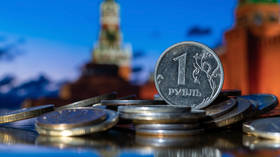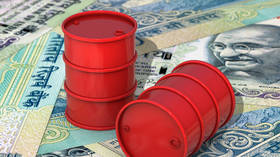Will Western sanctions deal a fatal blow to Russia’s economy?

“We are crippling Putin’s war machine by denying him access to the money & support he needs to fund his illegal war." The words British Foreign Secretary Liz Truss tweeted, on Thursday.
Her message would have scarcely been questioned by Western audiences, as it is perceived widely that in response to the situation in Ukraine, the US and its allies have indeed ganged up to impose severe costs on Russia. This has involved blacklisting many wealthy Russian businesspeople, often incorrectly referred to as ‘oligarchs’, freezing the assets of the country’s Central Bank, expelling some financial institutions from SWIFT, closing airspace to Russian planes, as well as many more sanctions.
These collective measures have created the impression that the military offensive in Ukraine will ultimately cripple Russia before it can achieve its goals. But all may not be what it seems. Beyond the fanfare and triumphalism of Western propaganda – which has now arguably become an echo-chamber owing to the censorship installed against anything that runs against the US government's narrative on this situation – a more nuanced reality is beginning to emerge.
This reveals that Western sanctions have failed to deliver the knockout blow required to fatally wound the Russian economy, or to upend any of its most important sectors. While bruised, Moscow is in a stronger position than they would like to admit.
Despite all the hype about newly-found unity, the European Union, at least at the moment, does not have the political capital, will, or strength to impose an embargo on the import of Russian oil and gas, one of key revenue sources for Moscow. Despite some of the more hawkish members of the bloc in the East demanding this, the economic consequences of a Russian energy ban seem to have have rendered consensus impossible and Germany, and Hungary, have publicly placed the brakes on such measures, warning of a potential economic catastrophe.
Although the hope of far-flung deals with Qatar and the United States as alternatives has been thrown around, the geographic distance and inconvenience of such vendors means feasibility is questionable and prices will be considerably more expensive. This proposal has not eased the anxiety concerning the markets, which along with the conflict has led to a global surge in natural gas and crude oil prices.
This, of course, is a gain for Moscow.
Identifying the European Union's strategic weakness, this has allowed Russia to strike back with a countermeasure. President Vladimir Putin announced on Wednesday that his country would accept payment for gas exports to “unfriendly countries” in rubles only. A decision which sent natural gas prices skyrocketing again.
It effectively means that countries in Europe dependent on Russian gas would have to purchase Russia’s currency first, strengthening its role in international markets, and in turn, driving up the value of the ruble. Following the announcement, the Russian currency grew rapidly to a three-week high of 95 rubles against the dollar and has since settled at 96, over the weekend. Earlier this month, the ruble plunged to historic lows of 132 rubles per dollar and 147 rubles per euro, on forex markets. Before the launch of the military operation in February, the exchange rate was around 75 rubles a dollar and 85 rubles to a euro.
All this demonstrates that Russia’s economic situation is almost certainly not as bad as initially expected.
In addition, the US and its allies have not achieved the global isolation of Russia’s economy to the extent they claim. Western commentary has an annoying habit of exaggerating disapproval from the West alone as representing the will of the ‘international community’ or affirming ‘international isolation’. As two critical examples, the US and its allies have not been able to dissuade India or China from purchasing Russian oil and gas. On the contrary, despite US threats, India is now buying even more Russian "black gold." Persian Gulf states, including Saudi Arabia and the United Arab Emirates, have also been sympathetic to Moscow.
Perhaps they are concerned that the same tactics may one day be used against them.
Russia’s economy will undoubtedly take some hits from the sanctions, but one month since the start of the operation in Ukraine, its most critical sectors remain largely unscathed.
The West ultimately cannot completely ban Russian oil and gas without unleashing a catastrophe in the global markets which would induce massive collateral damage, hence why US reportedly resorted to asking Nicolas Maduro – the leader of Venezuela, who they have attempted to depose – to increase oil supplies.
This gives Russia time, money, and space to reorientate its economy away from the West, including diversifying its currency transactions, building new industries, affirming its strategic independence, and finding new markets. India and China will play the biggest roles in this, but Pakistan, Indonesia, Vietnam, and many countries in Latin America and Africa will also be important.














